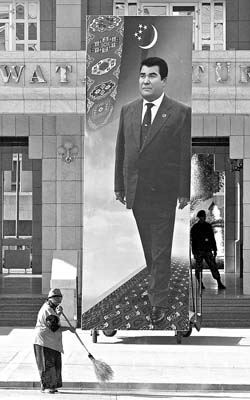The end of Turkmenbashi’s era

Turkmenistan’s President Saparmurat Niazov, considered the living symbol of this Central Asian republic, died on Dec. 21. The 66-year-old president’s sudden death was caused by cardiac arrest. Niazov’s death marks the end of the 20-year-long era of the Turkmen president, who came to power in 1985 as the First Secretary of the Communist Party of the Turkmen Soviet Socialistic Republic. Since that time Turkmenbashi, the Father and “Great Chief” of Turkmenistan, was the unchanging leader of the country. The West regarded Niazov’s regime as one of the most authoritarian and repressive in the world. Ian Bremmer, an American expert on states in transition and a consultant on political risk, called Niazov a “rattling mixture of Brezhnev and Stalin.” Turkmenbashi also had the reputation of being an eccentric leader, who would often surprise the mass media with his wooly statements and deeds. In 2002 Niazov proposed renaming the months of the year with the names of national heroes, including him and his late mother. Niazov’s funeral took place on Dec. 24. Owing to the impossibility of identifying Turkmenbashi’s successor in the situation of absolute rule, experts view the head of the commission that organized the president’s funeral as the key moment for the future government: Turkmenistan’s Prime Minister Gurbanguly Berdymukhamedov, who is also fulfilling the duties of the president instead of the speaker of the Turkmen parliament, Ovezgeld Ataev. An expert on Central Asian questions, Bakyt Baketaev, admitted that “Turkmenbashi’s supporters must withstand the pressure” of the opposition, which is supported by the international community, in order to bring the country to international democratic standards. In an official appeal, the State Security Council, the Cabinet of Ministers, and the members of the Turkmen parliament declared that Turkmenistan will unswervingly follow its leader’s course and carry out the full scope of its duties in complete concordance with international agreements. The Russian president’s assistant, Serhii Prykhodko, issued an announcement that the Kremlin also expects that the new Turkmen leaders will continue the policy on developing bilateral relations. Turkmenistan’s policy concerning the CIS will most likely remain the same. Niazov’s position was that of detached onlooker: Turkmenistan has not signed more than half of the documents adopted by this organization and did not attend any summits. Ukraine had very good and close relations with Turkmenistan, especially in terms of cooperation in the gas and military-industrial spheres. Ukraine bought Turkmen gas, while Turkmenistan bought Ukrainian military equipment and machine-building products. Ukrainian companies also took part in many Turkmen projects.






